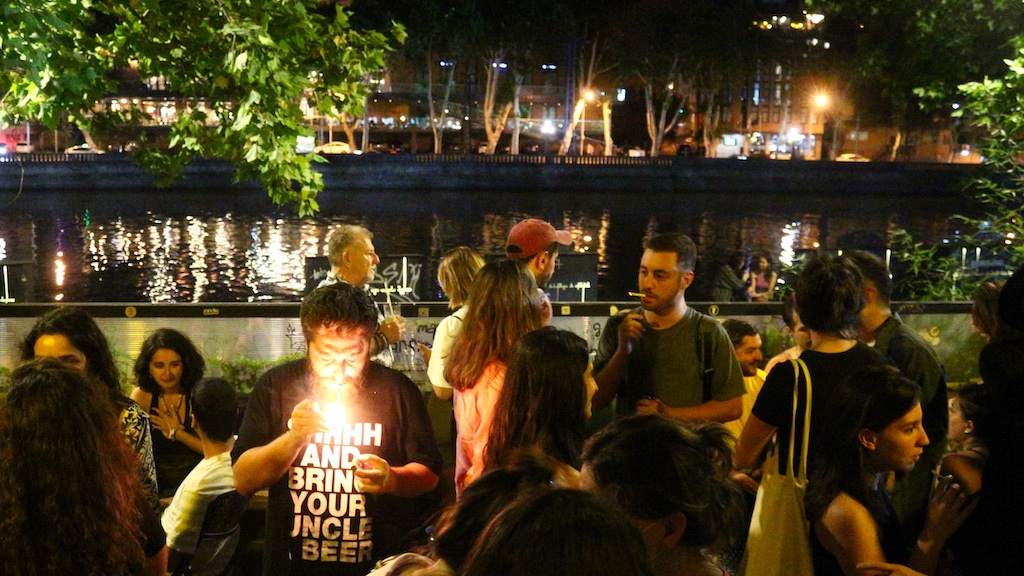Published
Fri, Aug 12, 2022, 09:45
- In the past week, the venue has received threatening messages and thousands of negative Google reviews.

Dedaena Bar in Tbilisi was the victim of a cyberattack last week after it launched its own 'visa form' to vet Russian attendees.
The attack, which began on August 4th, comprised thousands of negative Google reviews, a denial-of-service attack on the venue's website, threatening private messages and hundreds of negative comments on Instagram posts, some of which have been seen by Resident Advisor.
"Google reviews suddenly went up to 10,500," Dedaena Bar cofounder Data Lapauri told RA. "On the first two days we were receiving on average one review or comment per second."
This compares to the 400 or so reviews Dedaena Bar has received since opening in 2018. "Our website has been down 20 times too," he added. "At the moment, you can't see our menu, they deleted it." (The website was down again at the time of publication.)
According to Lapauri, the attacks were in response to the venue's self-designed "visa form," which was published via the website in April to help verify that Russian attendees aren't "actively supporting Russian soldiers in Ukraine."
The form asks Russians to tick boxes next to various political statements, including "I Didn't Vote For Putin, He Is A Dictator," "I Condemn Russian Aggression In Ukraine" and "20 percent of Georgia Is Occupied By Russia." Applicants must also agree to abide by the venue's house rules, such as speaking Georgian or English with staff, not paying in roubles and not engaging in political discussions while drunk.
"Everyone is welcome in our bar, our whole policy is about inclusivity," said Lapauri. "Our staff are from diverse backgrounds. We wouldn't say 'you are Russian, you can't be here.' But we really need to know people who come to the bar aren't supporting imperialist mindsets of Putin supporters, so we created this form."
The war in Ukraine has ramped up existing tensions between Georgia and Russia, which currently occupies 20 percent of Georgian territory. As a result of the Russo-Georgian War in 2008, 300,000 Georgians remain displaced after being forced from their homes in the contested regions of South Ossetia and Abkhazia.
Recent sanctions on Russia have propelled around 200,000 Russians to cross the border into Georgia, BBC reports. Lapauri said some of them have brought "really offensive" behaviour to Dedaena Bar.
"Some of our Russian punters didn't have any understanding of where they were: they demanded services in Russian, others were abusive, accusing us of being 'fascists,'" he said. "We had to address this so we came up with our own visa policy."
The initial response to the "visa form" comprised around ten offensive, one-star Google reviews, including one featuring the letter "Z," a symbol associated with the Russian invasion of Ukraine. Lapauri believed these comments were legitimate and weren't connected to the cyberattack. But when he posted a screenshot of them on Facebook, the situation began to escalate.
"We didn't expect to get the response we did," he said. "The post received 200 reaches in one day. By Thursday, it was apparent thousands of accounts were issuing negative Google reviews. Suddenly, thousands of comments on our Instagram posts appeared, a quantity we've never witnessed. It became obvious this was a coordinated cyberattack happening simultaneously from hundreds of accounts."
According to independent cyber security expert and content delivery advisor Maurizio Monti, "it's the AI that writes the messages [...] Sometimes, you can spot they don't sound written by humans, they just sound weird. But ultimately the low score will impact the organisation. Also, if you look at some of the reviews that are still there from six days ago, the majority aren't verified."
Monti said attacks like these are designed to damage reputations. "AI helps by writing a large amount of text (reviews in this case) very quickly. So as AI improves, so do the bots."
Lapauri said the reviews subsided as soon as Google responded. "It took them less than a day to take [them] down." The Instagram comments were still visible until they were turned off. These comments, as well as private messages, included threats to burn down the bar and to attack guests with acid. Others featured the digits "080808"—a reference to the 2008 attack on Georgia by Russia. The venue captured hundreds of screenshots as evidence.
"It's felt like some kind of bad dream," said Lapauri. "We're just a music venue for people to hang out, connect, have a good time, then all of a sudden we're getting attacked by these trolls who see us as the enemy and threaten to bomb our bar. It's something so surreal and unbelievable for us."
But response to Dedaena Bar's "visa form" hasn't all been negative.
According to Lapauri, roughly 2,000 Russians filled out the form. "The comments we received from them were really supportive," he added. "We have a lot of guests from Russia and other Russian-speaking countries who come to our live music, jam sessions and hip-hop events on Sundays and Tuesdays."
Opened in 2018, Dedaena Bar takes its name from the popular Dedaena Park, which surrounds the venue. The riverside spot regularly hosts live music, hip-hop nights and electronic DJs.